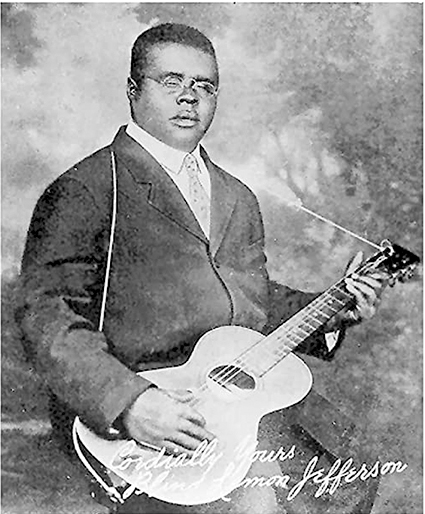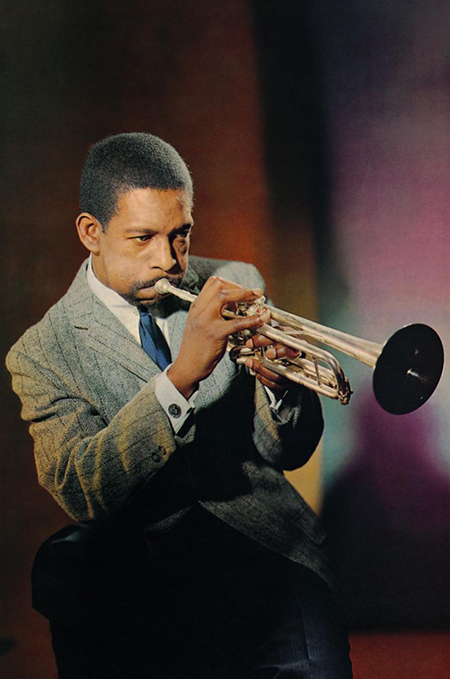 Wortham’s Blind Lemon Jefferson
Wortham’s Blind Lemon Jefferson
‘Father of the Texas Blues,’ Country Soul / Blues Vocalist and Guitarist
Lemon Henry “Blind Lemon” Jefferson was born blind in 1893 to parents Alex and Clarissa Jefferson in the community of Couchman (Coutchman) Freestone County, Texas. The Couchman area was situated between the railroad towns of Streetman and Wortham. He was the youngest of 6 children of a blended family of two stepbrothers, a stepsister, two brothers and a sister whose parents were sharecroppers in Freestone County. He was blind at birth for unknown medical reasons thus he was never able to work in the cotton fields with his family nor ever able to receive any kind of rudimentary education. However, as a child he was given a guitar to occupy his time and so began guitar strumming or picking and vocalizing the church hymns and field hand melodies he had heard. He was a completely self-taught musician by his teen years and became a street performer, working for small amounts of money tossed in a hat or container. He played his music for picnics, parties and dances or any venue that could provide monetary support for himself and his family.
During World War I, he migrated to Dallas in the “Deep Ellum” area where he met and began playing with another renowned early blues greats, Aaron Thibeaux Walker (T-Bone Walker) and Huddie Leadbetter “Lead Belly.” By this time, Blind Lemon’s guitar riffs and distinct vocal style and pitch made his music unique and unforgettable. He was also beginning to compose much of the music he performed thus adding another layer of talent to his musical genre. His artistry would have only been known regionally by pictures, written stories at that time as just another Texas born jazz artist at the beginning of the 1920’s Jazz Age. But the era’s early technology of recording music on gramophone discs spread his music nationally and internationally beyond Texas. He was one of the first to record as a solo vocalist, guitarist and composer.
He died in Chicago in 1929 at age 36 and is buried at Wortham’s Black Cemetery, where in 1967 a Texas Historical Marker was erected and later replaced in 1996 with a new marker and gravestone inscribed with a line from one of his songs, “Lord, It’s one kind favor I’ll ask you, see that my grave is kept clean.”
The Wortham Blues Festival, held each year on the second Saturday in September, was organized in his honor in 1997. At the Freestone County Historical Museum there is a Blind Lemon display with the book, “Country Blues” written entirely in Russian by Mr. Valery Pisigin as proof of his universal appeal.
 Fairfield’s Kenny Dorham
Fairfield’s Kenny Dorham
‘World Renowned Bebop Jazz Trumpeter’
Another musical great from Freestone County was McKinley Howard “Kenny” Dorham who was born in Fairfield, Freestone County on August 30, 1924 to a family accustomed to working in the cotton fields and farms of the area. However, the Dorham family was innately talented musically and Kenny started by learning to play the piano at the age of seven from gospel hymn music and other sheet music that could be purchased. As the depression was hard on all who toiled in agriculture, the Dorham family moved to Austin, Texas in the mid-1930’s where Kenny switched to playing the trumpet at east Austin’s Anderson High School. Besides music, he was also known as a tough, determined competitor on the school’s boxing team. After high school graduation, he briefly attended Wiley College in Marshall, Texas where, as an extracurricular and monetary activity, he played in a small jazz dance band. The dance band played music extremely popular at the time called “Swing” jazz. He had a passion for jazz of all kinds as a trumpeter and was beginning to add jazz composition and jazz arranging to his innate musical talent repertoire. But his college education and jazz band participation were interrupted by the World War II draft into the U.S. Army in 1942 where he joined the army’s boxing team. Upon discharge from the army, he went to Houston to resume “his on the job” training as a jazz band trumpeter, playing with Russell Jacquet Orchestra and later the Frank Humphries Band. In 1946, he was hired into the horn section of legendary Dizzy Gillespie Big Band Orchestra where he performed for a couple of years.
In 1949, he was recommended by Miles Davis to take his place in the Charlie Parker Quintet. After that his career continued to soar, where the Parker quintet played at the Paris Jazz Fest, among other celebrated venues. Into the 1950’s he performed with many other notables in jazz such as Thelonious Monk, Sonny Rollins and again with Dizzy Gillespie. He intermittently rejoined Charlie Parker Quintet and performed with Parker at Parker’s last performance at “Birdland” just a few days prior to Parker’s death later in March 1955.
Kenny’s musical interest as an arranger / composer embellished a developing later 1940’s Be-Bop jazz style, a precursor to “Rock and Roll” music, which became wildly popular with teenagers (of all ages) starting in the 1950’s. Be-Bop bands were smaller than the prevalent “Big Band” orchestras with only about 4 to 6 members playing horns, drums and often with the addition of guitars too. In Be-Bop, there was free spirited improvisation among the musicians and with their audiences, especially the teen-age dance audiences.
In 1961, Kenny Dorham recorded his “Whistle Stop” album which is regarded as his finest as a jazz trumpeter. His career waned in the 1960’s but he continued to play solo or with jazz bands, but also took other supplemental jobs. He continued to learn by performance and with more study of music at New York University. He helped sponsor youth music programs such as those provided by the Harlem Youth Act in New York. Sadly, Kenny’s health began to decline, and he died of kidney failure on December 5, 1972 at age 48 in New York where he is buried and remembered as one of the most innovative jazz musicians.
In 2012, the Trinity Star Arts Council sponsored a Kenny Dorham musical tribute, and in his honor, donated a bronze plaque to the Freestone County Historical Museum. Ten years later, Dr. Robert Pallitto from Seton Hall University in South Orange, New Jersey, visited the Freestone County Historical Museum and the Fairfield are for research on his anticipated Kenny Dorham book, “Whistle Stop.” We look forward to its publication later this year.
Submitted by Patricia Pratt – Curator, Freestone County Historical Museum




